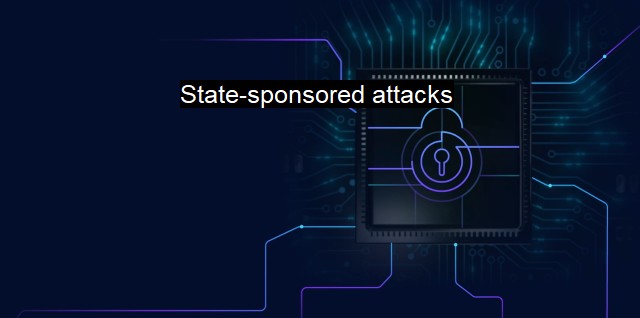What are State-sponsored attacks?
Advanced Persistent Threats: Understanding State-Sponsored Cyber Attacks and Their Implications for Cybersecurity Defense
State-sponsored attacks refer to a broad spectrum of cyber activities coordinated, funded, or executed by nation-states or their proxies with the purpose of infiltrating digital systems, accessing sensitive information of other countries or spreading disarray online. These endeavor are devoted to advance the strategic, political, economic, and military goals of nation-states. Hacking groups beneficiaries of support from government sectors across the world allegedly carry out most of the state-sponsored cyber-attacks. This support can range from funds, infrastructural resources, exceptional guidance regarding potential targets, or even leniency within the national legal construct.State-sponsored cyber-attacks manifest in numerous forms, all usually intending harm on diverse levels of severity. One type is Cyber Espionage, where government-backed hackers infiltrate systems to collect classified or sensitive data from foreign governments or corporations. This type of cyber-attack resembles typical cloak-and-dagger espionage efforts but gets executed digitally.
Simultaneously, a vivid form of state-sponsored attack is Cyber Warfare or Sabotage. Under this, hackers linked to a particular nation-state plan and cause definitive destruction or disruption. Power outages caused by hackers linked to Russia in Ukraine, or the reputed U.S. and Israeli Stuxnet malware attack on Iranian nuclear facilities, are examples of such devastating cyber warfare.
State-sponsored attacks can cause disinformation campaigns designed to manipulate public opinion, inflict reputational damage, or sow discord and confusion, usually via social media. These insidious forms of digital assaults have been particularly current, with various nation-states being accused of conducting such campaigns to affect political situations in other countries.
One key characteristic that distinguishes state-sponsored attacks from criminal cyber-attacks, is in the prominence of targets and the finesse of techniques used. Ordinary cyber attackers might target monetary gains; state-sponsored hackers seek higher stakes: breaching defense systems, intellectual property theft, destabilizing economies, or propagation of political narratives.
Likewise, while ordinary cyber-attacks might involve common hacking techniques, state-sponsored hackers generally employ advanced methods and tools. The levels of sophistication observed and the resources placed into these attacks often highly surpass regular cybercrimes. They might exploit zero-day vulnerabilities (flaws in software unknown to those who should be interested to fix them) or utilize advanced persistent threats (APT), where they infiltrate a network undetected and remain for a prolonged duration.
In this problematic digital landscape, the role of cybersecurity solutions like advanced, proactive anti-virus software becomes even more paramount. Technological advents, careful threat identification, continuous monitoring and immediate response to occurrences, successful foreign policies and international diplomacy could aid in countering these state-sponsored cyber-attacks which torment societies, businesses and governments alike.
The harsh truth is that, faced with a state-sponsored attack, no organization, individual, or nation can guarantee full immunity. In many cases, state-sponsored hacking campaigns have carefully studied the defenses of their targets for an extended period, maneuvering across data, structures, and character directions: thereby, raising alarms rarely, while extracting valuable data quietly.
The severity and high level of sophistication of state-sponsored attacks underline the importance of advanced cybersecurity measures to guard against them, given that documentation, monitoring, and perimeter security may no longer be sufficient. This would include advanced antivirus software, intrusion detection systems, and extensive monitoring and documentation. The situation also necessitates combined international efforts, public-private partnerships, robust incident management, and a commitment to cybersecurity education and awareness among internet users and organizations involved. Considering the serious potential of a state-sponsored attack breaking down global systems, the world must take notice and respond effectively.

State-sponsored attacks FAQs
What are state-sponsored attacks?
State-sponsored attacks are cyberattacks that are carried out or supported by a government or its intelligence agencies against another country, organization, or individual. These attacks are often politically motivated and may aim to steal sensitive information, disrupt critical infrastructure, or cause damage to the targeted entity.How do state-sponsored attacks differ from other cyberattacks?
State-sponsored attacks are generally more sophisticated and well-funded than other cyberattacks, as they are often carried out by highly skilled hackers with resources and backing from a government or intelligence agency. They also tend to have a specific political or strategic objective, rather than just seeking financial gain or causing mischief.What can be done to protect against state-sponsored attacks?
Protecting against state-sponsored attacks requires a multi-pronged approach, including investing in robust cybersecurity measures, implementing strong access controls, and training employees to recognize and report suspicious activity. It is also important to stay up-to-date on the latest threats and attack patterns, and to work with a trusted antivirus provider to ensure that your systems are protected against known threats.How can you tell if an attack is state-sponsored?
Identifying a state-sponsored attack can be difficult, as attackers often go to great lengths to cover their tracks and avoid detection. However, there are some signs that may indicate a state-sponsored attack, such as the sophistication of the attack, the target and its significance, the use of previously undiscovered vulnerabilities, and the use of malware or techniques associated with known state-sponsored groups. If you suspect that your organization has been targeted by a state-sponsored attack, it is important to notify law enforcement and other relevant authorities as soon as possible.| | A | | | B | | | C | | | D | | | E | | | F | | | G | | | H | | | I | | | J | | | K | | | L | | | M | |
| | N | | | O | | | P | | | Q | | | R | | | S | | | T | | | U | | | V | | | W | | | X | | | Y | | | Z | |
| | 1 | | | 2 | | | 3 | | | 4 | | | 7 | | | 8 | | |||||||